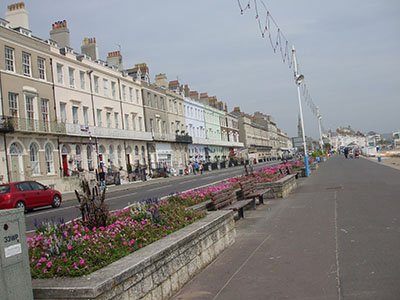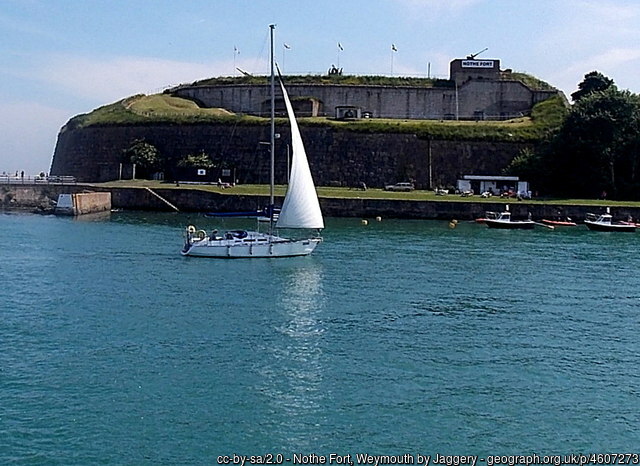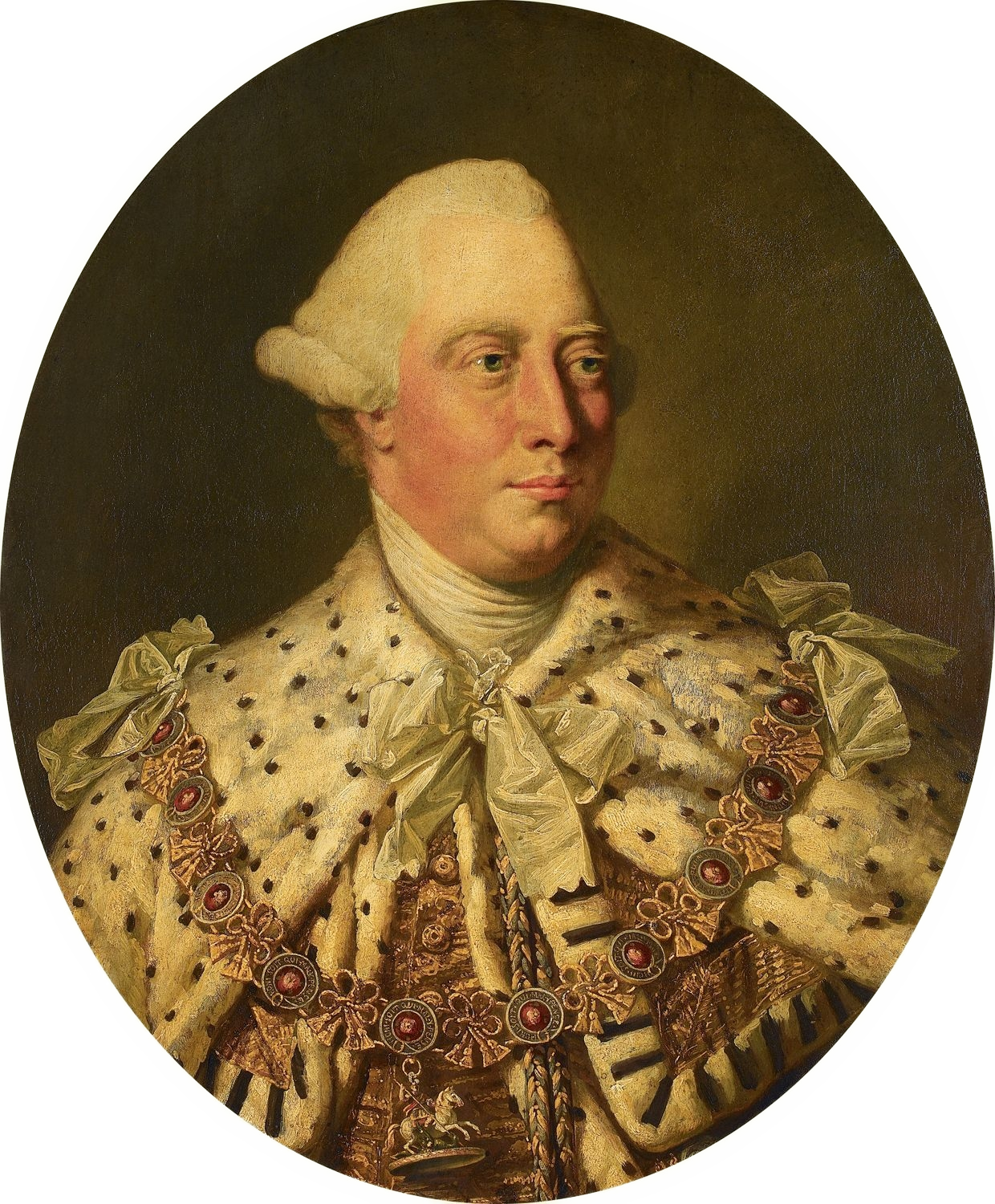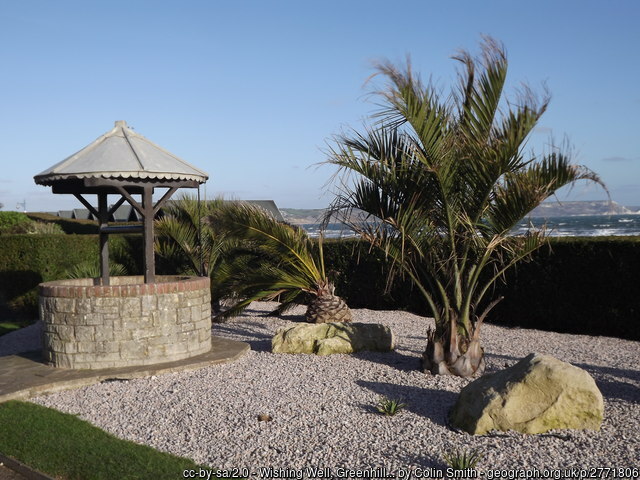Weymouth
Attractions abound in and around Weymouth. Soft golden sands beckon – sunbathing, safe swimming and paddling, ice creams, Punch & Judy shows, boating. There are lakes, museums, an aquarium and two shopping centres. That is before venturing out to the countryside around.
It was a bit faded in appearance perhaps but the loyal crowds came back year after year to this well loved seaside in its sheltered bay. With Olympic and Diamond Jubilee Year it has been spruced up and looks marvellous.
The Esplanade is now hotels and apartments for the
enjoyment of holiday makers. Guest Houses, B & B's and self catering
accommodation can be found in the town and camping and caravan parks
beyond.
There are always the little country cottages in the Dorset countryside

Hotels on the front
Photo © Copyright M. Temple

Events
As there are over 200 events held during the year it would be bad luck not to have one during a stay. The Carnival in August is a most popular event. There will be a big parade, aerial events, stalls, fun of the fair. All the enjoyment of a seaside festival. There are lots more!

Explore!
Weymouth is set halfway along the Jurassic Coast, England's first World Heritage site and ideally situated for exploring this ancient geology. 95 miles of stunning coastline with incredible views along the Dorset and Devon coastlines.
The South West Coastal path runs the entire length of the Jurassic coast and smaller paths link making shorter walks.
Now styled Weymouth and Portland Borough Council with the merger of Weymouth with the Urban District of Portland, the area is looking to the future. Regeneration took place for the 2012 hosting of the Olympic sailing events in Portland Harbour.
Weymouth and Portland waters have already been host to “Cutty Sark” Tall ships race three times. The area held the trials for the Athens Olympics and other eminent national and international sailing championships. These waters have been credited as the best sailing in Northern Europe.

Old Harbour
Considered one of the most picturesque harbours in Europe. A harbour probably from Saxon times and possibly earlier Roman habitation. The present waterfront is 17th century, old cottages and houses band together.
It is the mouth of the short five and a half mile long River Wey which rises in the Upwey Wishing Well and runs through the now Weymouth suburbs of Upwey, Broadwey, Radipole and through Radipole Lake to the Harbour.
Bustling still with life it is home to the fishing fleet that has found harbour here for centuries. Watch the catch being landed – different sorts of sea fish, crabs and lobsters. That's why the fish and chips are so good!
Speedboats can be hired, diving trips arranged or check out the boat trips from the harbour.

Channel Island Ferry
This busy, picturesque harbour of Weymouth not only still holds a fishing fleet, it is home to the Channel Island ferry. These roomy and comfortable ferries run 7 crossings weekly to both Guernsey and Jersey. There are also 7 crossings weekly to St Malo in France.
Day trips to Guernsey and Jersey available!

Nothe Fort

Nothe Fort
Photograph © Jaggery
Impressive, imposing and a major landmark. The views are nothing less than magnificent – into Weymouth, over to Chesil Beach, the Isle of Portland and the Dorset coast. A camera is a necessity!!!
The fort is on the south side of Weymouth Harbour and it juts out into the sea.

Deep Sea Adventure
Captivating - Two floors of tales of the deep. Audio visual and interactive displays illuminating underwater adventures and nautical deeds from the 1600's to now. Includes the Titanic disaster exhibition.
Take the kids to Sharky's afterwards or you will not see the rest of the exhibition! Sharky's is a great idea for a wet day in more ways than one!
You will find this delightful venue on Custom House Quay.

Hope Square
The Square, close to the harbour breathes bars, cafes and bistros
The Red Lion pub has a date on the building of 1878, sells real ales.
No 1 Hope Street is the interestingly dubbed Pilgrim House named for the
emigrants who left Weymouth for America. It now houses Age Concern.

Tudor House
This little gem can be found in Trinity Street. It is a pity there are so few of these ancient houses left. Shows what it would have been like to be a middle class family and living in the 1600's.

Boot Inn
One of Weymouth's oldest pubs and situated in High Street West. Another Tudor gem. It is said to be haunted by a seamen in heavy sea boots! A pint in a haunted pub - hmmmm!

Greenhill Gardens
Overlooking the sea these beautiful gardens are enchanting. Walk in the morning when the air is fresh, for pleasant afternoon stroll or a wander in the cool of the evening as the sun goes down. What ever time of day they captivate the eye. It is hardly surprising they have a Green Flag for excellence.
Walking is not the only pastime. Putting courses are always fun, here there is an 18 hole one. Energetic – four tennis courts await.
Remarkable is the Schneider Trophy Weathervane. As a Flight Lieutenant, George Stainforth set a world air speed record of 406.92 mph in a Schneider supermarine S6B seaplane in 1931. (he was later a Wing Commander) The Trophy was originally presented to Weymouth College where he had been a student.
George Stainforth held another record, he flew upside down for twelve minutes. As a superb airman he was an experimental pilot at Farnborough. He was also a holder of the Air Force Cross. While serving in the Western Desert with the RAF during WWII he was killed in a plane crash.
The floral clock chimes - cuckoo type chimes. There is a clock house nearby housing the mechanism to keep the clock ticking. The clock has been here since 1936.
Money thrown into the Wishing Well is collected and donated to charity. Bennett's Shelter has been a haven for a well deserved sit down since 1919. However if you fancy an ice cream, a coffee or a bite to eat there are two cafes for your pleasure.
Nothe Fort can be seen from Greenhills Park – look out across the bay.

Lodmoor Country Park
A 350 acre country park within a pleasant fifteen minute walk of the town centre - from the Esplanade walk through Greenhill Gardens and in to the Park.
If you fancy continuing walking there are lovely footpaths to explore. Wind your way through green countryside over little bridges, past trees and shrubs. If you are on a spring walk you will be particularly lucky – carpets of daffodils line the walks. Perhaps with Wordsworth your “heart with pleasure fills and dances with the daffodils”

Nature Reserve
Walk on into the nature reserve. The world is miles away. A two and a half mile walk that is a real pleasure, whatever the season. Wheelchair friendly too. Wander amongst a wet grassland and saltmarsh environment with small reed beds and open water. This habitat caters for a wide variety of both land and water birds.
Bring your binoculars. Observation points around the reserve enable a viewer to bird watch for hours. A good spot to take the children for their first bird watching trip, there is so much to see.
Just a taster:
Spring time – Soft spring sunshine, showers, warblers squabbling noisily amongst the reeds, courtship displays, insects making trills in the calm open water, fish rising, swallows, swifts and martins arriving for the summer season, birds making nests, rustling amongst the reeds, coots swimming and darting into the reeds.
Summer – An English summer sky with white fluffy clouds a background for swirling birds, birdsong, flourishing cute chicks swimming behind their parent in sun bathed water, chicks hidden in their nests demanding to be fed by their hard worked parents. Wading birds, water birds, shy birds hidden by bushes.
Autumn – A softer English sky and autumn colours of yellow, red and brown, falling leaves, the time of a job well done – a new generation reared. Spot the waders feeding in the reserve on a migration from the Artic to Africa – a feat that is mind boggling. Watch the swallows and swifts gather in large flocks for their autumn migration. See them weave magic patterns in the sky.
Winter – Cold grey skies, rain, frost and the reserve is just as busy. Birds industrious on the shore and over the marsh. Probably spot a heron. With the reserve in her bare winter clothes, birds are more visible. The reserve is a winter haven for bittern, spotting one is lucky though.
Lodmoor has a large colony of fascinating common terns visible right through the year.
This place is a joy - and not just for the serious bird watcher.

Sealife Park and Marine Sanctuary
Lodmoor Park. An magnet for all the family. There are indoor and outdoor attractions. Close encounters of the aquatic kind.
Pre booking is essential and it is a cashless attraction.

Rio Grande Railway
In the summer season this model railway runs round the events area in Lodmoor Country Park for the benefit of visitors.

Other facilities in Lodmoor Country Park
A small cafe for a cuppa.
The Lodmoor Pub has a large restaurant
Children between five and ten have a small play area.
A large grassed events area – circus, motor rallies fetes and can be hired for private events.
BBQ and Picnic area
9 hole pitch and putt summer season.

Radipole Lake
Weymouth has two bird sancturies – the other and equally beautiful is Radipole Lake. Like Lodmoor it too is in the centre of the town. Paths are suitable for wheelchairs and pushchairs. Large numbers of birds are attracted by the habitat and summer and winter there is plenty to see. Reedbeds, open water, water meadows – bring the binoculars – get lost in the absorbing natural wildlife.

Hardy Way
A 220 mile long distance trail that passes through Weymouth. The footpath starts in Higher Bockhampton where Thomas Hardy was born and finishes at Stinsford where his heart is buried. Ideal for Hardy fans for the path runs through Bere Regis, attractive Lulworth Cove, interesting Corfe Castle, Shaftesbury on the edge of Cranbourne Chase, the second highest village in Dorset which is Evershott and the county town of Dorchester. Can of course be walked in stages.

Route 26 National Cycle Network
This 86 mile cycle route also passes through Weymouth. It starts in Portishead in Somerset and winds its way through the Cathedral city of Wells, Castle Cary, Yeovil and Dorchester.
A good idea is to follow Sustrans suggestion and do it in three sections,

History of Weymouth

George III 1738-1820 is responsible for making Weymouth what it is today. It was his favourite place to spend his summer holidays between 1789 and 1805. Well who could blame him! Soft sandy beaches, lovely bay, warm gentle climate... Medicinal qualities of the waters were said to be good for the health. George III bought Gloucester House from his brother and made it his summer home.
Did eighteenth century Royal children frolic on those soft golden sands and paddle in the gentle waves as children do today.
Tributes to George III can be seen, the most obvious is the horse and rider cut into the chalk hill at Osmington. It faces away from Weymouth and King George III took offence for it looked as though Weymouth did not want him. The opposite was definitely true. A painted statue to George III stands on the seafront. It was renovated in 2007/8.
With George III's presence of course came the aristocracy and the well heeled and these account for the elegant Georgian and Regency architecture running in a graceful arc along the Espanade. In front is the brightly coloured Jubilee Clock erected for the 50th year of the reign of George III's grandaughter, Queen Victoria in 1887. As well as one to George III, there is a statue to Queen Victoria on the Esplanade.
Weymouth never looked back. One of the original seaside resorts it has grown and developed to be a favourite of hundreds of tourists.
Originally the fishing villages of Melcombe Regis and Weymouth, by the middle of the thirteenth century the harbour became a seaport. It was probaly Anglo Saxon in origin but not much is known of this era. Melcombe Regis exported wool and Weymouth imported wine from France. They both supplied ships and men to the monarch of the time.
The centre of Weymouth was originally Melcombe Regis and Weymouth was the twin village on the south shore of the bay. These two fishing villages were rivals giving rise to many arguments over the use of the harbour. Elizabeth I acted as referee and in 1571 she made them the double borough of Weymouth and Melcombe Regis. Over the years this has been shortened to Weymouth.
Disaster - Melcombe Regis is said to be one of the points of entry for the Black Death in 1348. It is thought that two million people died throughout the country along with most of the Melcombe Regis area.. Many villages were deserted. As a consequence labour was short and wages became higher with increased mobility of the population. Even so the foundation of society had not changed and the shortage of labour eventually evened out. Britain had changed forever.

Other pages that may be of interest

Return from Weymouth to Home
Or you might prefer to browse some more, please do, there are navigation buttons above on the left.
Enjoy


The Wishing Well in Greenhill Gardens
Photograph © Colin Smith

Useful Information
Things change. Always check out the external links for the latest information.
These are just helpful suggestions only.
There is only one affiliate link, SBI.
Travel Wessex is a Guide.


This is a developing map. Some areas have better coverage.
To find the nearest Electric Vehicle Charging Point please click here.

Public Transport
If you do decide the leave the car at home and help the environment too, why not go National Express. They run coaches all over the country. Some pretty good fares too.
Just imagine - sit back and relax, no hassling with the traffic!!!
Do you know that you can book on your mobile phone and they will send the ticket as a text!!!!

National Rail Journey Planner.
For train journeys all over the United Kingdom connecting the places you want to go efficiently and quickly.

Traveline is a very useful resource for public transport throughout Wessex, even local buses. In fact all over the United Kingdom.



